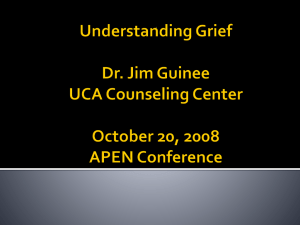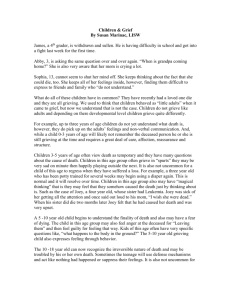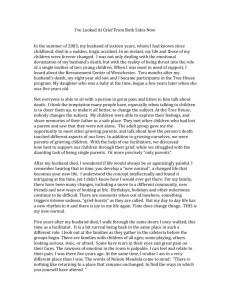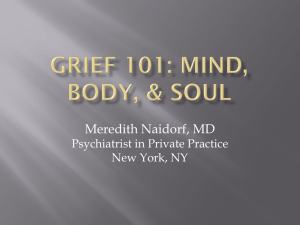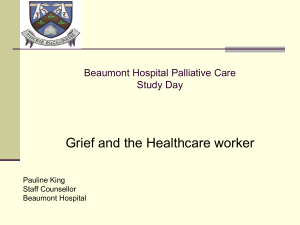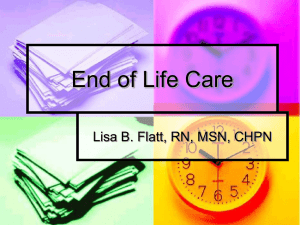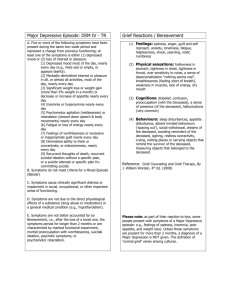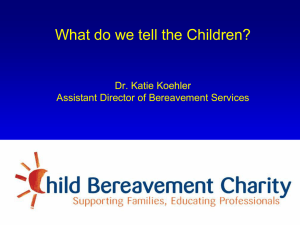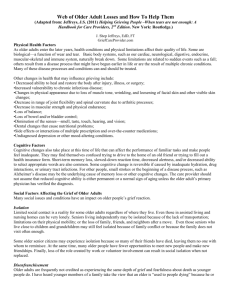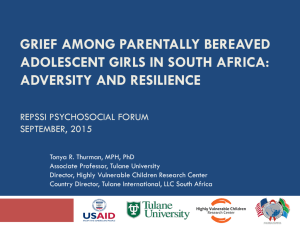Death Outline - Counseling Center Village
advertisement
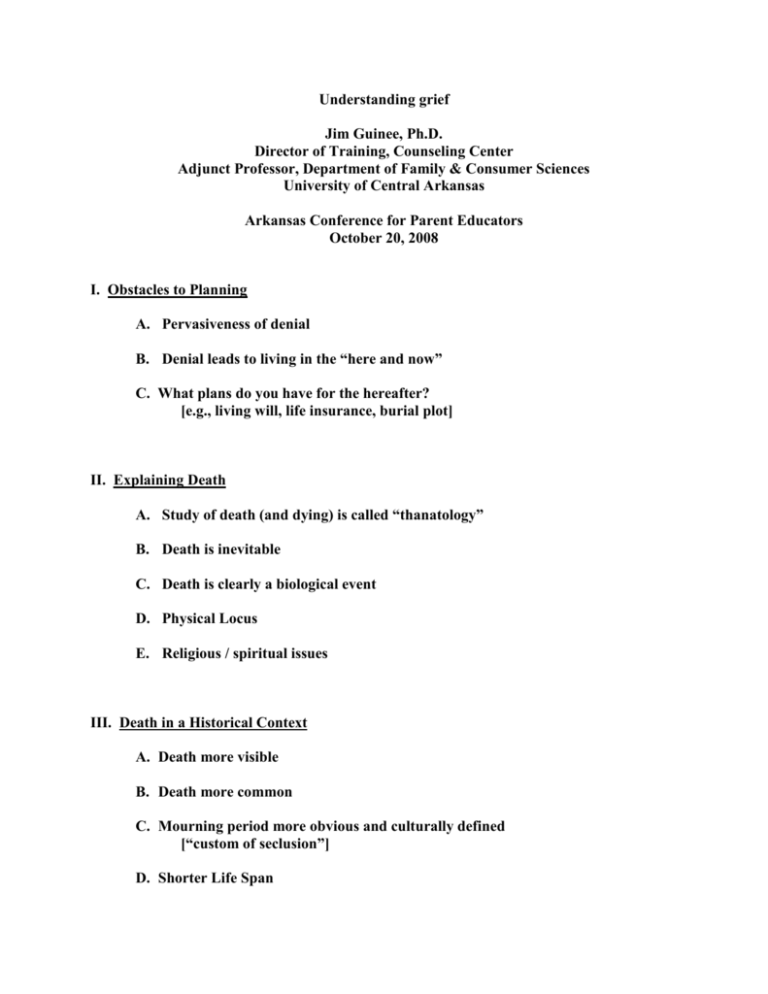
Understanding grief Jim Guinee, Ph.D. Director of Training, Counseling Center Adjunct Professor, Department of Family & Consumer Sciences University of Central Arkansas Arkansas Conference for Parent Educators October 20, 2008 I. Obstacles to Planning A. Pervasiveness of denial B. Denial leads to living in the “here and now” C. What plans do you have for the hereafter? [e.g., living will, life insurance, burial plot] II. Explaining Death A. Study of death (and dying) is called “thanatology” B. Death is inevitable C. Death is clearly a biological event D. Physical Locus E. Religious / spiritual issues III. Death in a Historical Context A. Death more visible B. Death more common C. Mourning period more obvious and culturally defined [“custom of seclusion”] D. Shorter Life Span IV. Importance of studying grief reactions A. Everyone has the painful experience of loss B. Our culture poorly understands, poorly responds to grieving individuals C. The psychological responses to grieving are fairly common D. Applying the pattern of grieving the deceased to other losses V. Complicated Bereavement A. Anniversary Reactions B. Frozen Grief / Ambiguous Loss C. Mistreatment of the Deceased D. Mummification E. Bereavement Overload VI. Basis for Normal Grieving A. Some general comments B. Common cognitive and behavioral reactions in grief -Preservation of personal effects -Attachment to physical reminders -Constant thinking, obsession, even “illusions” -Dreams of the deceased VII. Stages to Recovery -People experience a wide range of emotions, especially early on in grief process -People go through a discrete set of stages, though not necessarily in linear fashion -Stages can be applied to other LOSSES -Stages can reveal where bereaved is STUCK Theorized Stages: 1. Shock/Denial 2. Fear 3. Longing 4. Anger 5. Depression 6. and finally…Acceptance VIII. What affects the grief process A. Intensity of relationship B. Mental health (e.g., independence, security) C. Length of relationship D. Age of deceased E. Uniqueness of relationship F. Circumstances of death G. “Perceived” closeness H. Religious beliefs I. Age of bereaved IX. Children and Death A. Some Thoughts Children’s initial exposure often result of a pet dying Children have a very hard time understanding death Children: ages 0-5 death equated with departure, seen as temporary (i.e., sleep) ages 5-9 death can be undone; might not be permanent B. Development of children’s understanding of death: Death is permanent, universal, nonfunctional C. Typical questions children ask 1. Why do people die? (why did X die?) 2. Are they being punished? 3. Where do they go? 4. When will they return? 5. Will YOU die? D. Suggestions: -Do not use euphemisms [“Grandma is in God’s house”] -It is not necessarily bad to take child to funeral service -Be open and honest with children -Plan on revisiting the issue (again and again) -Remember the stages if grief, because you will see them evidenced in your children -LISTEN LISTEN LISTEN X. Helping yourself and others respond to grief 1. It is ok to not want to let go right away 2. You will never completely let go 3. How bad you feel should not be confused with how much you loved them 4. It is good to talk to others and let others talk to you [“Dear God”] 5. Don’t be surprised if others react differently to this person’s death than you do 6. Be patient with yourselves and others 7. Do not be surprised that a death will affect many areas of your life 8. What is “normal” and “abnormal” is more HOW LONG rather than WHAT 9. Plant seeds of hope 10. Start within and work out as far as possible XI. Book Suggestions 1. C.S. Lewis "A grief observed" ISBN 0-7861-7861-2 2. Elizabeth Kubler-Ross "On death and dying" ISBN 0-6848-4223-8 3. Kenneth J. Doka, Charles A. Corr (Editor), Bruce Jenning (Editor) "Living with Grief: Ethical Dilemmas at the End of Life" ISBN: 1-8933-4906-3 4. Staudacher, C. “Beyond Grief: A guide for recovering from the death of a loved one.” ISBN: 0-934986-43-6 XII. Website Suggestions 1. A website on pet bereavement http://catanddoghelp.com/animals/bereavement.php 2. Grief over the loss of a child http://www.compassionatefriends.org/ 3. Grief Recovery Institute http://www.grief-recovery.com/
